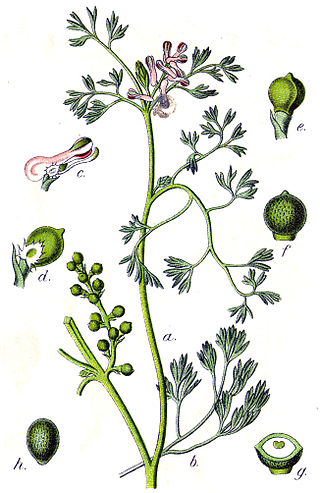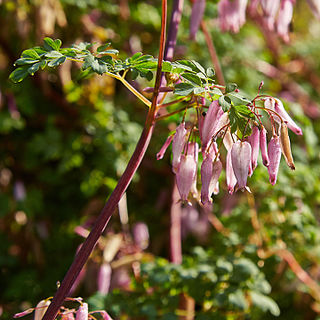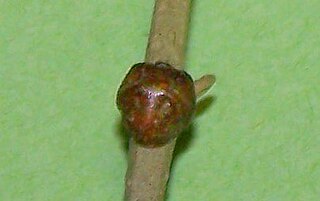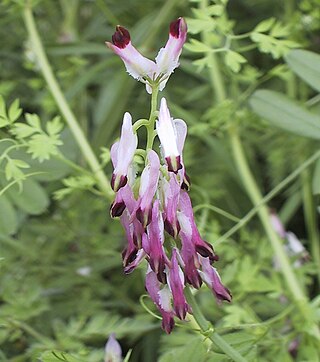
Fumaria is a genus of about 60 species of annual flowering plants in the family Papaveraceae. The genus is native to Europe, Africa and Asia, most diverse in the Mediterranean region, and introduced to North, South America and Australia. Fumaria species are sometimes used in herbal medicine. Fumaria indica contains the alkaloids fuyuziphine and alpha-hydrastine. Fumaria indica may have anti-inflammatory and analgesic potential.

Fumaria officinalis, the common fumitory, drug fumitory or earth smoke, is a herbaceous annual flowering plant in the poppy family Papaveraceae. It is the most common species of the genus Fumaria in Western and Central Europe.

Fumaria parviflora is a species of flowering plant known by the common names fineleaf fumitory, fine-leaved fumitory and Indian fumitory. It is native to Europe, Asia, and Africa, but it is common and widely distributed in many other parts of the world. It is sometimes weedy. The small flowers are dull white with purple tips. The fruit is a rounded nutlet with a central crest.

Adlumia fungosa is a species in the Papaveraceae that is commonly known as the Allegheny vine, climbing fumitory, or mountain fringe. It is a herbaceous, creeping, flowering plant and is closely related to the Fumitory genus, Fumaria.

Fumaria bastardii, commonly, tall ramping fumitory or bastard's fumitory, is a tall, many-branched herbaceous flowering plant native to Western Europe including the British Isles and the northern Mediterranean. The species is a weed of arable and disturbed ground, and occurs as an introduced alien in many areas of the world with suitable climates, including Southwest Australia and North America.

Fumaria muralis, known as common ramping-fumitory or wall fumitory, is a flowering herbaceous plant in the poppy family (Papaveraceae) native to western Europe and northwestern Africa.
British NVC community OV6 is one of the open habitat communities in the British National Vegetation Classification system. It is one of six arable weed and track-side communities of light, less-fertile acid soils.
British NVC community OV13 is one of the open habitat communities in the British National Vegetation Classification system. It is one of eight arable weed and wasteland communities of fertile loams and clays.

Corydalis nobilis, the Siberian corydalis, is a perennial plant native to Siberia, Xinjiang and Kazakhstan. It was introduced to Europe by Linnaeus, who had asked his friend Erich Laxmann for seeds of Lamprocapnos spectabilis, but was sent seeds of C. nobilis instead. Both Lamprocampnos and Corydalis are members of the family Papaveraceae, with seeds having an attached elaiosome that makes them attractive to ants, which disperse the seeds.

Fumaria capreolata, the white ramping fumitory or climbing fumitory, is an herbaceous annual plant in the poppy family Papaveraceae. It is native to Europe, western Asia and northern Africa and naturalised in southern Australia, New Zealand, and southern South America. Common names include also ramping fumitory, white fumitory, and white-flower fumitory.
Fumaria occidentalis, the western ramping-fumitory, is a species of flowering plant in the genus Fumaria that is endemic to Cornwall. It is the largest of the British fumitories, and was discovered in 1904.

Saissetia oleae is a scale insect in the family Coccidae. It is considered one of the three main phytophagous parasites of the olive tree, together with the olive fruit fly and the olive moth. Although it is a common parasite which occurs most often in olive trees, it is a polyphagous species, also attacking citrus trees as well as various ornamental shrubs such as oleanders, pittosporums, sago palm, and euonymus.

Fumaria purpurea, known as purple ramping-fumitory, is an annual flowering herbaceous plant in the poppy family which is endemic to the British Isles.
Fumaria abyssinica is an herbaceous annual plant in the poppy family Papaveraceae. It is native to East Africa and the Arabian Peninsula. It grows in upland rainforest and bamboo forest, and has become a weed in local farms.
Fumaria barnolae is a species of plant in the family Papaveraceae.
Fumaria bicolor is a species of plant in the family Papaveraceae.

Fumaria flabellata is a species of plants in the family Papaveraceae.
Fumaria gaillardotii is a species of plant in the family Papaveraceae.

Fumaria schleicheri is a species of annual herb in the family Papaveraceae. They have a self-supporting growth form and have simple, broad leaves. Individuals can grow to 19 cm.

Fumaria vaillantii, or earthsmoke, is a species of perennial herb in the family Papaveraceae. They have a self-supporting growth form and simple, broad leaves. Individuals can grow to 28 cm.













